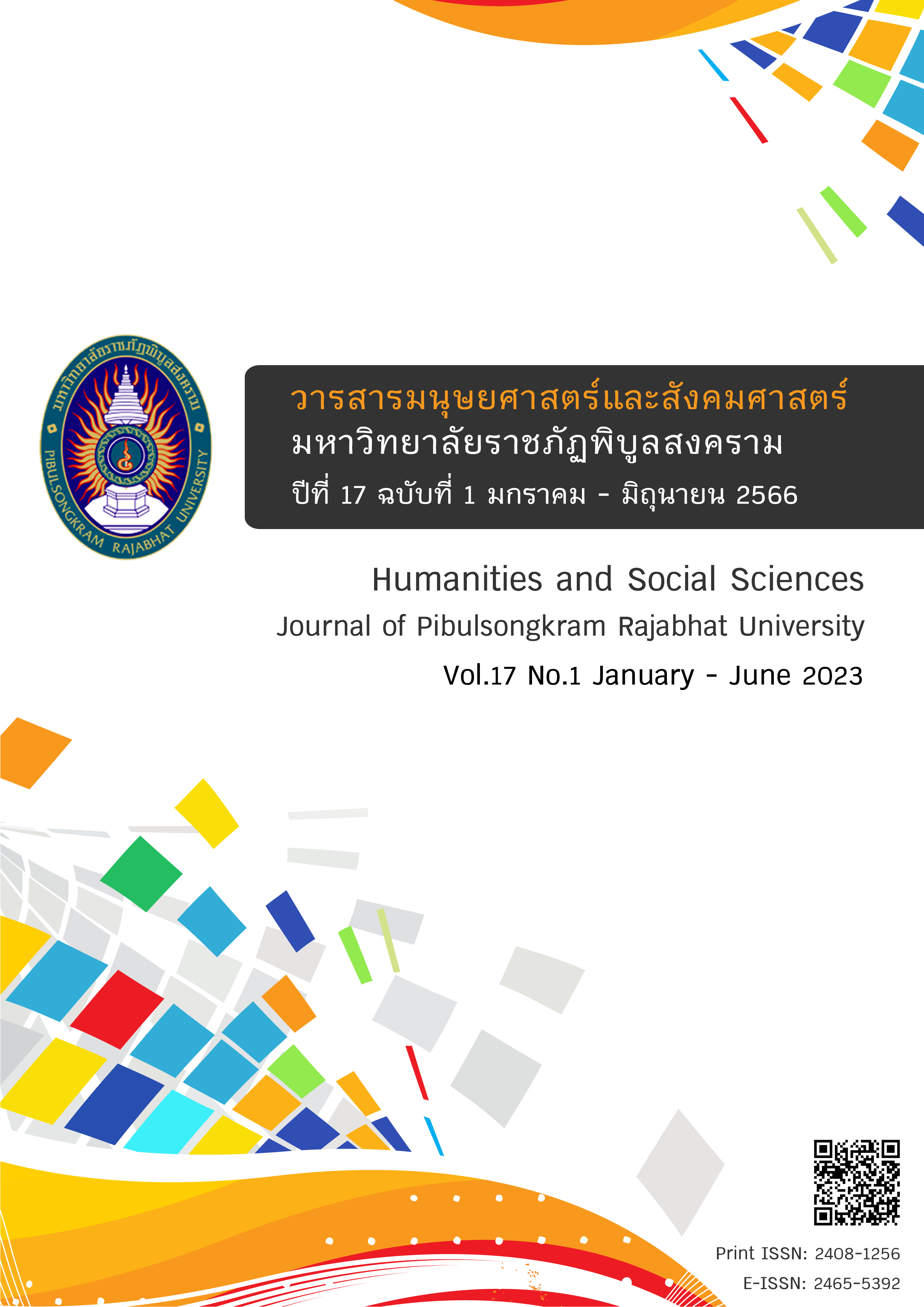Learning Community: Kanchanaburi Organic Agriculture Community Enterprise Network
DOI:
https://doi.org/10.14456/psruhss.2023.3Keywords:
development mechanisms, human resource development, organic agriculture, learning community, community enterpriseAbstract
The research objectives were to study the knowledge and network management, analyze the human resource development mechanism, and to synthesize a model of learning community development for the Kanchanaburi Organic Agriculture Community Enterprise Network. The 92 key informants were selected using purposive sampling methods consisting of farmers in the Kanchanaburi Organic Community Enterprise Network, and representatives of development partners. Data were collected through in-depth interviews, small group discussions, and observations. Data were analyzed based on content analysis and interpretation. Data verification used a triangulation technique, while information accuracy was tested by verifying it with informant representatives. The results revealed that the learning community development to the Kanchanaburi Organic Agriculture Community Enterprise Network had basic principles consisting of: sufficiency, self-reliance, and organic agriculture. Practical intellectual learning based on social capital and participation created a body of knowledge consisting of: sufficiency economy philosophy, lifelong learning, wisdom and dependence on natural resources, production and standards, situation analysis, group management, digital communication and network-based marketing management, and the integration of public power. Learning network management identified the components: learning, participatory network management, and partner synergy. Human development mechanisms consisted of concepts and practices, development policies and strategies, networks, and change agents. Synthesizing these elements resulted in the network's learning community development model being fundamentally at the heart of the process. Development mechanisms stimulated and reinforced the learning process by using knowledge and network management to contribute to the development of the network's potential to be self-managed on the basis of sustainable development.
References
กฤติยา อนุวงศ์ และสุรสิทธิ์ วชิรขจร. (2564). การพัฒนารูปแบบและวิธีการจัดการเครือข่ายที่เหมาะสมสำหรับประเทศไทย: กรณีศึกษาเครือข่ายในสังกัดกระทรวงการพัฒนาสังคมและความมั่นคงของมนุษย์. วารสารมนุษย์ศาสตร์และสังคมศาสตร์ มหาวิทยาลัยราชภัฏพิบูลสงคราม: 15(2), 347-361.
เกษม วัฒนชัย. (2559). การเรียนรู้ที่แท้และพอเพียง. กรุงเทพฯ: มติชน.
โกวิทย์ พวงงาม. (2553). การจัดการตนเองของชุมชนและท้องถิ่น. กรุงเทพฯ: บพิธการพิมพ์.
ครรชิต พุทธโกษา. (2554). คู่มือการพัฒนาชุมชนแห่งการเรียนรู้ (ฉบับสมบูรณ์). กรุงเทพฯ: สำนักงานคณะกรรมการวิจัยแห่งชาติ.
จันทร์ตนาพร วงศ์ชัย ประสงค์ ตันพิชัย สันติ ศรีสวนแตง และวีระฉัตร สุปัญโญ. (2557). ความหลากหลายของทรัพยากรธรรมชาติสู่ความมั่นคงทางอาหารของชุมชนเพียลาด อำเภอสังทอง นครหลวงเวียงจันทน์ สาธารณรัฐประชาธิปไตยประชาชนลาว (สปป.ลาว). วารสารวิชาการ Veridian E-Journal: 7(2), 156-172.
ชุติมา ถวัลย์ปรีดา และคณะ. (2564). ชุมชนแห่งการเรียนรู้กับการพัฒนาชุมชน. วารสารการจัดการและพัฒนาท้องถิ่น มหาวิทยาลัยราชภัฏพิบูลสงคราม, 1(2), 97-111.
ธนากร สังเขป. (2555.) การพัฒนาที่ยั่งยืน. กรุงเทพมหานคร: วี.พริ้นท์ (1991).
ธิชาภรณ์ กำนันตน มาริษา อนันทราวัน และโชติ บดีรัฐ. 2563. PLC ชุมชนแห่งการเรียนรู้ทางวิชาชีพสู่การพัฒนาสาวิสาหกิจชุมชนอย่างยั่งยืน. Journal of Modern Learning Development 5(4), 159-172.
พัชรี ทองเรือง ปัญญา เลิศไกร และกันตภณ หนูทองแก้ว. (2560). รูปแบบชุมชนแห่งการเรียนรู้ที่ยั่งยืน. วารสารนาคบุตรปริทรรศน์ 9(2), 192-205.
วิฑูรย์ ปัญญากุล. (2555). ความรู้เบื้องต้นเกษตรอินทรีย์. กรุงเทพฯ: สุภา.
ศิริภัสสรศ์ วงศ์ทองดี. (2556). การพัฒนาทรัพยากรมนุษย์. กรุงเทพฯ: วี.พริ้นท์ (1991).
สุโรจนา อาษาศึก. (2557). การพัฒนาชีวิตมนุษย์ในทัศนะของกลุ่มเกษตรกรรมยั่งยืนจังหวัดเชียงใหม่. (วิทยานิพนธ์ศิลปศาสตร์มหาบัณฑิต). เชียงใหม่: มหาวิทยาลัยเชียงใหม่.
สำนักงานจังหวัดกาญจนบุรี. (2565). แผนพัฒนาจังหวัดกาญจนบุรี (พ.ศ.2561-2565) ฉบับทบทวนใหม่รอบปี พ.ศ. 2563. สืบค้น 2 มกราคม 2565, จาก https://ww2.kanchanaburi.go.th/ebook/detail/13/data.html
สำนักงานพัฒนาการวิจัยการเกษตร (องค์การมหาชน). (2565). เกษตรยุคใหม่ ผันตัวสู่นักธุรกิจเต็ม
รูปแบบ. สืบค้น 15 กุมภาพันธ์ 2565, จาก https://www.arda.or.th/knowledge_detail.php?id=24
สำนักงานสภาพัฒนาการเศรษฐกิจและสังคมแห่งชาติ. (2564). เป้าหมายของการพัฒนาที่ยั่งยืน 17
เป้าหมาย. สืบค้น 25 ธันวาคม 2564, จาก https://sdgs.nesdc.go.th
อมรพิมล พิทักษ์ และพีรเทพ รุ่งคุณากร. (2564). แนวทางการพัฒนาเกษตรกรสู่การเป็นผู้ประกอบการธุรกิจเกษตร. วารสารวิจัยราชภัฏกรุงเก่า 8(1): 17-23.
Sigleman, C.L., and Shaffer, D.R. (2003). Life-Span Human Development. 4th ed. Pacific Groce, California: Brooks/Core.
Udomwech, A., Jai-Aree, A., and Srisuantang, S. (2020). Reflections on learning experience for self-management: The concepts and practices of Sanam Chai Khet Organic Agricultural Group, Chachoengsao province, Thailand. Kasetsart Journal of Social Sciences 41 (1): 68-74.
United Nations. (2021). Sustainable Development Goals. Retrieved February 2, 2021 from
Downloads
Published
How to Cite
Issue
Section
License
Copyright (c) 2022 Humanities and Social Sciences Journal of Pibulsongkram Rajabhat University

This work is licensed under a Creative Commons Attribution-NonCommercial-NoDerivatives 4.0 International License.
Any articles or comments appearing in the Journal of Humanities and Social Sciences, Rajabhat Phibulsongkram University, are the intellectual property of the authors, and do not necessarily reflect the views of the editorial board. Published articles are copyrighted by the Journal of Humanities and Social Sciences, Rajabhat Phibulsongkram University.









